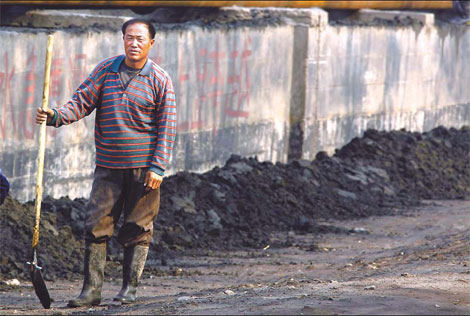Strategic reserves for rare metals mulled
|
|
|
A worker takes a break from shoveling tailings out of a channel sluicing crushed mineral ore containing rare earths on the edge of Baotou in the Inner Mongolia autonomous region on Sunday.[China Daily] |
Chinese authorities may establish strategic reserves of 10 rare metals to stabilize their supply and prices, a move analysts said reflects the country's growing concern over scarce resources.
The 10 metals are rare earths, tungsten, antimony, molybdenum, tin, indium, germanium, gallium, tantalum and zirconium, the Shanghai Securities News reported, citing unnamed sources.
The move is aimed at achieving a balance between market supply and demand as well as maintaining price stability, the report said. It is the first time the government has considered strategic reserves for these metals, except for rare earths, tungsten and indium, it said.
Rare metals, which are regarded as "vitamins for the economy", are essential to China's development. Construction of reserve systems will help ensure economic security, analysts said.
"A sound reserve system is like a reservoir, which can help us better use the resources," said an industry insider who did not want to be named.
China is rich in some rare metals, such as rare earths, tungsten, and antimony, but it has not exploited these resources properly. The country can better manage these resources with a reserve system, he said.
China has to import some rare metals such as tantalum for the long term. A reserve can protect the domestic market when there is a shortage in supply or price fluctuations in overseas markets, he said.
Many industry insiders have long called for a formal and comprehensive system to store the rare metals.
A number of countries, like the United States and Japan, have already built their reserve systems for rare metals. China may learn from these countries' experiences to build its own mechanism, they said.
Some analysts said the country's existing oil reserves system, which is formed from national reserves and stockpiling by enterprises, can also offer some lessons in that regard.
"The government and key enterprises in the industry should work together to protect the scarce resources," said Han Xiaoping, chief information officer of domestic energy portal China5e.com.
China's State Bureau of Material Reserve operates under the National Development and Reform Commission (NDRC). It is taking charge of formulating strategies for reserves and managing the State purchase of mineral reserves.
China will sell 50,000 tons of zinc from the country's stockpiles to increase domestic supplies as an energy-saving drive curbs output and boosts prices.
The country will also auction ingots from State reserves on Nov 9, the NDRC said in a statement. These reserves were bought from domestic smelters between February and May last year.
Analysts said the move was probably made to help offset reduced production as China is limiting power supplies to smelters.
 0
0 







